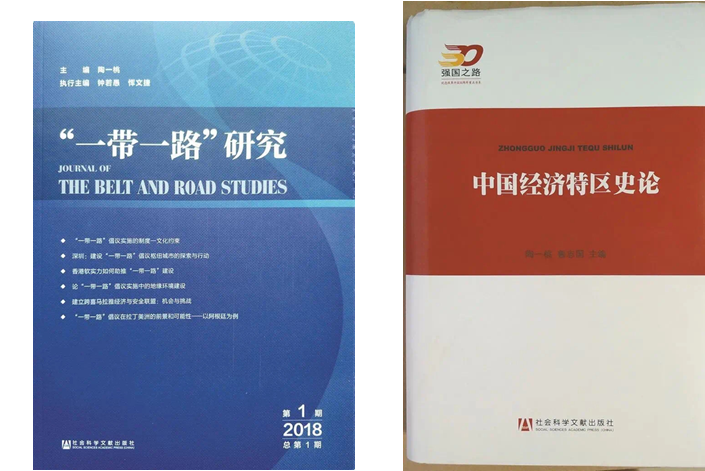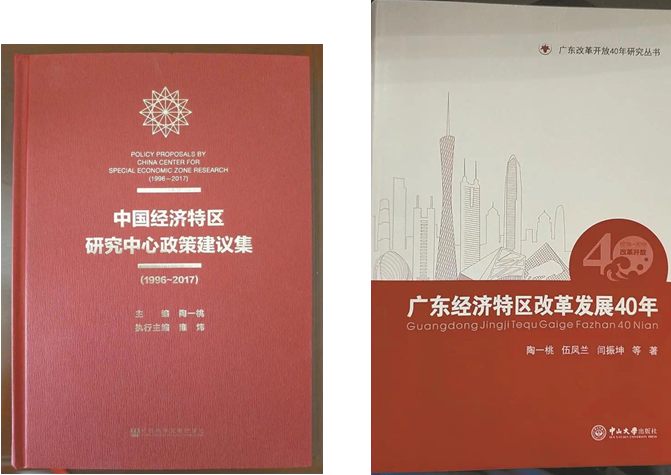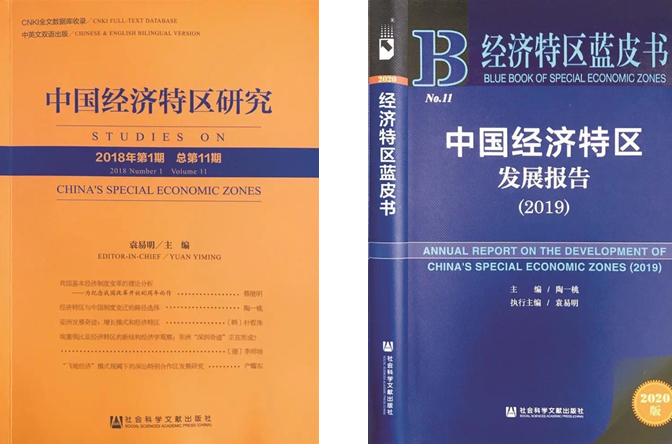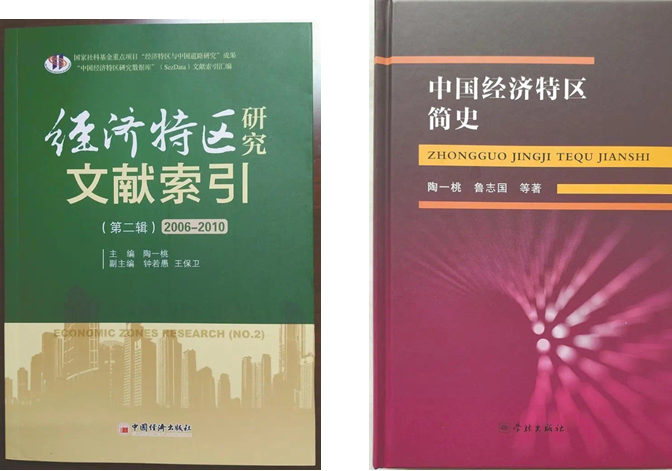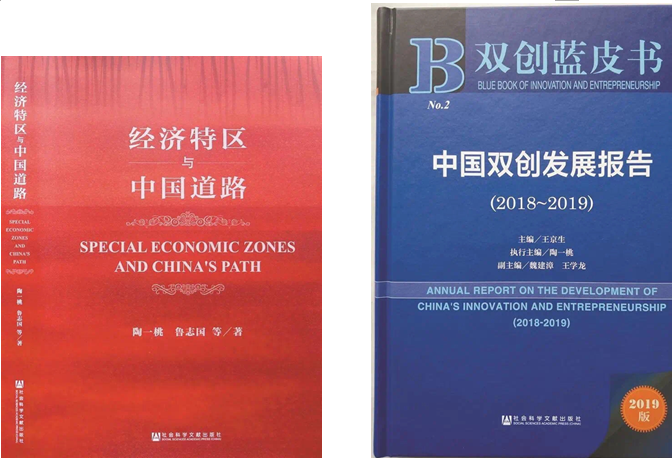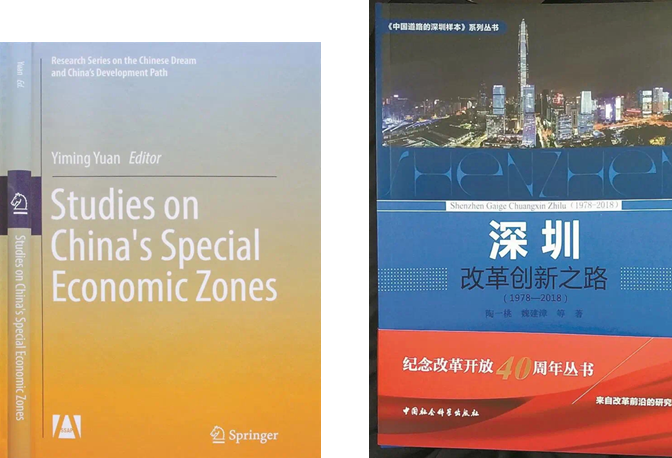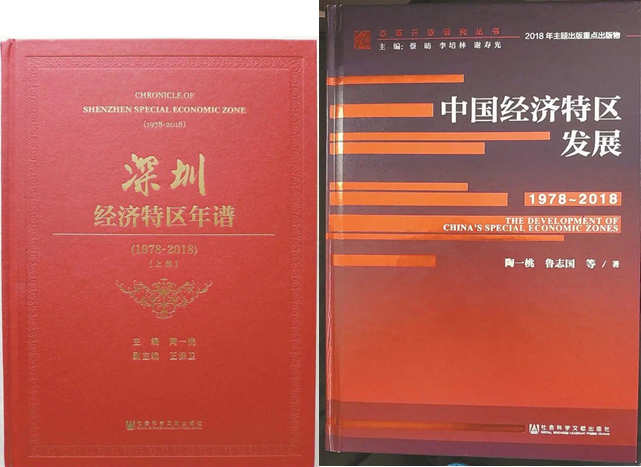On August 18, on its special edition, Shenzhen Special Zone Daily ran a full-page story about the China Center for Special Economic Zone Research (CCSEZR), Shenzhen University (SZU), a key research base for humanities and social sciences under the Ministry of Education.
Zhang Ping
This year marks the 40th anniversary of Shenzhen Special Economic Zone (SEZ). It is also a crucial year to build in full force the Guangdong-Hong Kong-Macao Greater Bay Area and the Pilot Demonstration Area of Socialism with Chinese Characteristics. As an academic institute focusing on the study of Special Economic Zones (SEZs), the China Center for Special Economic Zone Research (CCSEZR), SZU has witnessed the development of Shenzhen and gone through an extraordinary journey with Shenzhen SEZ.
The growth of CCSEZR is not only the result of the deepening institutional change in Chinese society, but also that of natural selection of the discipline development and development of SZU. The years it has gone through witness the academic heritage, the accumulation of ideas, exploration achievements, and the harvest of efforts. While benefiting from the wisdom, profound knowledge, and noble character of selfless, fearless, and far-sighted pioneers, it fostered a group of young thinkers with academic ability.
CCSEZR is a provincial key research institute of humanities and social science approved by the Ministry of Education of China in 2001. It is the only academic institute focusing on the study of SEZs among all key research bases for humanities and social sciences under the Ministry of Education and now has become an academic think tank with clout both in and outside of China in the field of SEZs research. For a long period, CCSEZR has been focusing on the research on the theory of the socialist market economy, on SEZs, on the forefront of China’s reform and opening-up policy, and on China's Path. It has always been at the forefront of the study of China's SEZs, the comparative studies of SEZs in and outside of China, and the study of SEZs and China’s Path, and has produced a number of influential academic achievements. CCSEZR has a doctoral degree program in the first-level discipline of Theoretical Economics, a post-doctoral research station, and a national innovation team in Theoretical Economics. Four university-level scientific research institutions are operating based on CCSEZR, including the Institute of Special Economic Zones, Taiwan, Hong Kong, and Macao Economies Studies, the Institute of Population Research, the Belt and Road Research Institute, and the New Economy and Finance Research Center.
CCSEZR is not only the base of Theoretical Economics of SZU, but also an open academic platform underpinning the development of Philosophy and Social Sciences and Humanities of SZU. It is the only liberal arts discipline among the first batch of disciplines granted the right to confer doctoral degrees at Shenzhen University. Under the leadership of the first-level discipline of Theoretical Economics, two non-catalog second-level disciplines have emerged, namely Management Science and Economic Decision-Making, and Creative Economy and Cultural Industry. Scholars in Management, Law, Literature, Psychology, Life Science, Urban Planning and Design, and Civil Engineering also conduct interdisciplinary research at the post-doctoral research station of the first-level discipline of Theoretical Economics.
01
Milestones and Early Academic Achievements:
China’s earliest SEZ research institute and pioneers
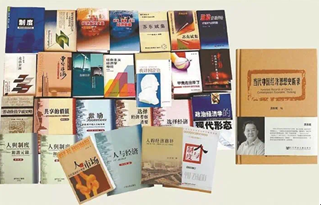
Under the leadership of Prof. Su Dongbin, the academic research and discipline development of CCSEZR have been effectively expanded.
The photo shows some of the works of Prof. Su
The history of CCSEZR can be traced back to the establishment of SZU. In 1985, two years after the establishment of SZU, the Special Economic Zones Economic Research Institute of Shenzhen University, the earliest academic institute focusing on the study of SEZs in China, was established by the beautiful Shenzhen Bay. It is the predecessor of CCSEZR, a key research base for humanities and social sciences under the Ministry of Education. Well-known economists including Fang Sheng, Zheng Tianlun, Liang Wensen, Chen Zhuohua and Wang Xiaomin successively served as the director, and produced many pioneering research achievements on SEZs at that time, which laid an important and solid foundation for the development of the institute.
In 1986, Guangdong Provincial Higher Education Bureau organized relevant experts and scholars to appraise and approve the Economics of SEZs to be a key discipline in the higher education system of Guangdong province, and recogized the SEZs Economic Research Institute as a scientific research institute of the provincial higher education system. The Economics of SEZs, a new course, was born out of the university of China's first SEZ. Early representative achievements include: Research on the Development Strategy of Shenzhen SEZ, with Liu Guoguang as the chief editor and Liang Wensen as the deputy chief editor (published by Hong Kong Economic Herald and the SEZs Economic Research Institute of SZU, 1985); The Past, Present, and Future of China's SEZs, with Liang Wensen as the chief editor (published by Hong Kong Economic Herald and the SEZs Economic Research Institute of SZU, 1988); Collection of Articles on the Research of SEZs, edited by the SEZs Economic Research Institute (Journal of Shenzhen University, 1988); 10 Years of China's SEZs: Shenzhen Volume, with Zheng Tianlun and Chen Zhuohua as the chief editor (published by the Center for Contemporary Asian Studies, the Chinese University of Hong Kong and the China SEZs Data Research Office, 1990); A Dictionary of Contemporary Chinese Economy, with Zheng Tianlun as the chief editor (China Economic Publishing House, 1993); The Economics of SEZs, edited by the Department of Economics of SZU and the SEZs Economic Research Institute (Guangdong Higher Education Press, 1988).
At the end of 1993, the renowned economist Prof. Su was transferred to Shenzhen University to take charge of the institute. The SEZs Economic Research Institute of SZU was renamed as the Institute of Special Economic Zones, Taiwan, Hong Kong, and Macao Studies. Since then, the Institute has ushered in a new and historic stage of development.
Professor Su graduated from the Department of Economics of Peking University in 1968, majoring in Political Economy. He used to be the director of the Institute of Special Economic Zones, Taiwan, Hong Kong, and Macao Economies Studies, SZU, deputy director of CCSEZR, a professor at Peking University, and a member of the Standing Committee of the CPPCC of Guangdong Province. In 1992, he was entitled with special allowance from the State Council.
He has long been committed to the basic theories of economics, especially Marxist political economy, socialist market economy theory, and studies on SEZs. He has published an abundance of papers in academic journals such as Economic Research Journal and Economic Science, of which 18 have been reproduced in full by Xinhua Digest. A great number of his monographs with significant academic value and influence have been published by Peking University Press, People's Publishing House, and China Social Science Press. For example, An Introduction to Socialist Economics (1987), Choice Economy (2000), Modern Forms of Political Economy (2002), People and Market (2005), People and System (2006), and other 25 books. Many of his theories have exerted a profound influence on Chinese academic circles, such as academic viewpoints including Labor Value (1987), New Socialism (1989), and Create Income (2002), policy suggestions like “Promoting Reform through Opening-up (2000)”, and thoughts and thinking methods including Teleology (1992) and The Logical Unity of the Two Testing Standards (1998). He has written a large number of articles for the People's Daily, Guangming Daily, Economic Daily, and Shenzhen Special Zone Daily, introducing Deng Xiaoping Theory, the important thought of Three Represents, the Scientific Outlook on Development, One Country, Two Systems policy, etc. CCTV’s Xinwen Lianbo has interviewed him many times, and his academic article We Came Out After All won the first prize of National Newspaper Excellent Paper Award.
Under the leadership of Prof. Su, academic research, discipline development, the formation of the research team, and academic exchange in and outside of China have been effectively expanded and significantly promoted. To adapt to the ever-innovating new era, the SEZs Economic Research Institute of SZU was renamed the Institute of Special Economic Zones, Taiwan, Hong Kong, and Macao Economies Studies (the Institute), SZU in 1995. The Institute organized the 1995 Seminar on Modern Enterprise System, Shenzhen, China, the minutes of which were reproduced by Xinhua Digest and drew significant responses from the public in China. In 1996, The Economics of SEZs, a provincial key supporting discipline, undertaken by the Institute, passed the appraisal of the key discipline of the eighth Five-Year Plan for the higher education of the province and was listed as a key supporting discipline by Guangdong Province. The research group of the Economics of SEZs successfully held the "Two Transitions" academic seminar, which aroused significant responses from the academic circle in China. The "Political Economics" major was awarded one of the first batch of three master's programs at Shenzhen University by the State Education Commission. It was the first to achieve a historic breakthrough in the right to confer a master's degree among all disciplines of SZU. Inspired by the creativity of Prof. Su, the Institute established the Suggestions Leaflet, an irregular internal policy consultation journal.
In 2000, the Institute was renamed and established as CCSEZR, SZU. In 2001, with its unique academic experience and academic clout in the SEZs research in and outside of China, CCSEZR was designated as the key research base for humanities and social sciences of provincial universities under the Ministry of Education. In 2005, three CCSEZR-based disciplines with unique research characteristics became the first doctorate programs of SZU, including Political Economics, Optical Engineering, and Signal and Information Processing. In 2012, the first-level discipline of Theoretical Economics was granted as a post-doctoral research station, which is to date the only post-doctoral research station for humanities and social sciences in SZU. In 2013, the first-level discipline of Theoretical Economics was listed as one of the Panfeng key disciplines of Guangdong Province.
With the persistent efforts of a group of early scholars who studied on SEZs, CCSEZR grew with the development of Shenzhen SEZ, expanded as China deepened reform and opening-up, and explored its own development path the way as China explored China’s Path. CCSEZR has found a unique development model that develops think tanks by taking advantage of discipline development, which in turn drives discipline development. It has gradually yielded and perfected its unique and continuous research achievements and academic brands with its academic heritage and shouldered the mission of studying SEZs and China's Path.
02
Academic Achievements and Academic Brands: Ideas and Explorers of Ideas in Shenzhen Special Economic Zone
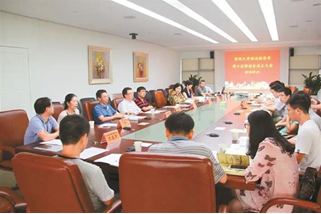
CCSEZR has fostered a group of young scholars with solid academic knowledge. The photo shows the founding conference of the postdoctoral fellowship in Theoretical Economics of SZU
At present, CCSEZR has an academic innovation team with a solid theoretical foundation, abundant academic achievements, extensive academic clout and reputation in and outside of China, and nearly half of the researchers have overseas study or exchange background. Among the full-time and part-time researchers are Changjiang Scholars, experts entitled with Special Government Allowance from the State Council, chief experts of major projects of the National Social Sciences Fund, Outstanding Social Scientists of Guangdong, National Academic Leaders, and overseas high-level talent. In recent years, the research of CCSEZR team has been expanded from the traditional SEZs research to researches on the Bay Area economy, the free trade areas, the development history of China's SEZs, the history of China’s reform and opening-up, and the history of China’s reform and opening-up ideas. In the past 10 years, team members have won the National Social Sciences Fund for 2 major projects, 1 key project, and 13 general projects, the Natural Science Foundation of China for 7 projects, 5 major projects of the Ministry of Education of China, the post-doctoral foundation for 43 projects, more than 40 provincial projects, and 110 horizontal projects. The team's research funding totals exceed 15 million yuan. Many of their articles have been reproduced in full by Xinhua Digest, China University Academic Abstracts, and Replicated Journals of Renmin University of China. They have published 32 academic monographs and more than 300 academic papers on major international journals such as Economic Research, SCI, and SSCI source journals, and won 20 scientific research awards at or above the provincial level.
The History of China's Special Economic Zones, with Professor Tao Yitao and Professor Lu Zhiguo as the chief editors, was listed in the 35 recommended books directory of the “China's 30 Years of Reform and Opening-up” series by the Publicity Department of the Central Committee of the Communist Party of China in 2008. Prof. Tao is the director of CCSEZR and an academic leader in Theoretical Economics. The book was included in the Translation Project of Chinese Humanities and Social Sciences of the National Social Science Fund of China and was published outside China by the Paths International Ltd. In 2011, the book won the first prize of the Outstanding Achievement Award of Philosophy and Social Sciences of Guangdong Province. The book Special Economic Zones and China's Path as the culmination of the key project supported by the National Social Science Fund of China was listed in the Frankfurt Book Fair Directory in Germany in 2016. In December 2017, it was listed in "China Book International" and "Project for Translation and Publication of Chinese Cultural Works" of State Council Information Office and the State Administration of Press Publication, Radio, Film and Television and was published in Arabic by Sefsafa Publishing House. The book was also listed in the 2017 publishing program of Nestor Publishing House of the Russian Academy of Sciences and was published in Russian and distributed outside China. In early 2018, the book was included in the list of annual funded books of the Silk Road Book Project Office and was published outside China in Mongol. It won the first prize of the Outstanding Achievement Award of the Social Sciences of Guangdong Province in 2019. As the projects of the Counselor Office of the State Council, Annual Report on the Development of China's Innovation and Entrepreneurship (Blue Book), Annual Report on the Development of China's Bay Area Economy (Bay Area Blue Book), and Journal of the Belt & Road Studies (Journal) have been undertaken by CCSEZR. Prof. Tao, director of CCSEZR, has successively undertaken key projects and major projects of the National Social Science Fund of China. Currently, as the chief expert, she has undertaken the research "History on the Development of China’s Special Economic Zones (1978-2018)", a major project of the National Social Science Fund of China, and led the innovation team in Theoretical Economics of SZU to devote themselves to the theoretical research on China's reform and opening-up. Prof. Tao was awarded the Outstanding Social Scientist of Guangdong for her outstanding contributions to the research on SEZs and China’s Path.
CCSEZR has gone through an arduous and wonderful journey in the past forty years. After years of development, it has now formed the "seven academic brands" and become an academic think tank with clout both in and outside of China in the field of SEZ research.
1. World Special Economic Zone Development Forum (China Special Economic Zone Forum).
Since its establishment in 2001, the forum has been held for 20 sessions. It has long been an increasingly international and influential academic forum with widespread attention and active involvement of scholars and government officials both in and outside of China. By upholding the concept of “academics and research going global”, China Special Economic Zone Forum was renamed as World Special Economic Zone Development Forum in 2012 to attract more scholars and government officials from emerging market economies to participate in discussions on the SEZ construction and the path choice of emerging market economies’ modernization. The first World Special Economic Zone Development Forum was held in Quang Ninh Province, Vietnam in 2014. In addition to the "5+2" SEZs and state-level new areas, it was successively held in Hulin - Russian Far East, Kashgar - Horgosh, Changbai Mountain in Jilin Province, Harbin, Shenzhen, and other places, and the proceedings of which have been published.
2. Joint Conference on Research of China's Special Economic Zones.
It is a regular work conference attended mainly by scholars studying the SEZs and government officials of the SEZs. Since 2003, it has been held 8 times in China's typical "5+2" SEZs and emerging SEZs such as Kashgar, which has become an important regional cooperation platform for communication and exchanges among China's SEZs (Free Trade Area).
3. Annual Report on the Development of China’s Special Economic Zones (Blue Book).
The book was first published in 2009 and has been published for 11 consecutive years. Professor Yuan Yiming, deputy director of CCSEZR, serves as the executive editor of the book. It is currently the only authoritative annual report on the status quo, development situation, and development trend analysis of China’s SEZs. In recent years, an introduction to the development of SEZs around the world was added in the Blue Book, and foreign scholars are welcome to join the research team.
Since 2016, the Blue Book has been published outside China by Springer, a German publishing house.
4. Studies on China’s Special Economic Zones (Journal).
Founded in 2008 and edited by Prof. Yuan Yiming, the Journal has been published in an uninterrupted run of 12 issues. It is the only academic journal published in both Chinese and English in and outside China that specializes in SEZs of China and the world.
Since 2014, the Journal has been published outside China by Springer, a German publishing house.
5. Index to Research Literature on Special Economic Zones
It is basic literature on the collection and collating of the historical data of studies on Chinese and foreign SEZs. It was edited by Professor Zhong Ruoyu and Dr. Wang Baowei. Four volumes have been published, covering the research literature of Chinese and foreign SEZs since 1978.
6. Chronicle of Shenzhen Special Economic Zone.
It is a historical book about the history of the development of Shenzhen SEZ. The "Chronicle" started with the idea of Prof. Su Dongbin and was later written by Tao Yitao, Wang Baowei, and their team.
Since the first edition came out in 2008, two editions have been revised and published successively, recording all major events in Shenzhen SEZ over the 40 years from 1978 to 2018.
7. Suggestions Leaflet.
Founded in 1996 by economist Prof. Su Dongbin, it is a special internal journal that covers policy consultation and academic content. Dr. Yong Wei, who has studied in Japan, is now responsible for the journal. In a bid to "inspire sparks of theoretical ideas with distinctive insights and concise language", Suggestions Leaflet has been issued nearly a thousand articles since its establishment, playing an important and extensive role in providing suggestions for the local economic development.
The successful practice of Shenzhen SEZ spearheading the reform and opening-up provides its researchers with not only unique cases, but also the environment that the SEZs study needs. The history of the institutional change in Chinese society has not only selected Shenzhen, but also fostered many scholars who have grown up as the development of Shenzhen SEZ.
03
Think Tank Building and Academic Exchanges: Disseminators of the Successful Experience of SEZs Standing on the International Stage
In the process of China's reform and opening-up, national overall development strategies, including the Free Trade Zone, the Belt and Road Initiative, the Guangdong-Hong Kong-Macao Greater Bay Area and Building Shenzhen into a Pilot Demonstration Area of Socialism with Chinese Characteristics, have been successively introduced. Shenzhen-based CCSEZR, as a new type of think tank, sets a goal of “serving the country with an international perspective and independent views while upholding the concept of “academics and research going global”. It undertakes major research topics of national ministries and local governments, and provides policy advice and decision-making consultation. In the past three years, it has completed 27 research reports, 7 of which were adopted by publications such as Internal Reference. Entrusted by the African Development Bank, CCSEZR formulated the Management Guidelines for SEZs for its member countries, and made consultations and planning on SEZ building for countries and regions such as Vietnam, Laos, Cambodia, and the Russian Far East. Prof. Tao Yitao, Director of CCSEZR, was successively invited to give speeches in Brussels, where the EU headquarters is located, Pakistan, Cambodia, Thailand, Kazakhstan, Russia and other countries, sharing the successful experience of China’s SEZs and the significance and value of inclusive development under the BRI.
In 2013, the Organization Department of Shenzhen Municipal Committee of the CPC and the Human Resources and Social Security Administration of Shenzhen Municipality authorized CCSEZR to carry out cadre trainings. In 2014, Hu Chunhua, Secretary of the Guangdong Provincial Committee of the CPC, accompanied by Prof. Tao, visited Vietnam and signed a party and government cadre training agreement with Quang Ninh Provincial Government in Hanoi. Now local and non-local, domestic and foreign trainings go hand in hand, and a complete curriculum system focusing on the sharing of successful experiences in SEZs begins to take shape, which is closely related to theoretical frontiers and practical issues. CCSEZR collaborates on cadre training with the human resources departments of the CPC committees and governments in Guizhou, Heilongjiang, Yunnan, Sichuan, Chongqing, Hangzhou and other provinces and cities, and holds more than 10 thematic workshops every year. At the same time, CCSEZR conducts regular or irregular training courses for officials from Vietnam, Cambodia, Kazakhstan, North Korea, Papua New Guinea, and many other countries in Africa, and establishes a training mechanism for officials and senior managers from countries along the Belt and Road, offering Chinese solution to development challenges facing emerging market economies. CCSEZR carries out project researches with the World Bank, the United Nations Development Program, International Poverty Reduction Center in China, the Asian Development Bank, the African Development Bank, the German GIZ and other international organizations and institutions, holds international forums and senior government official trainings. It has established stable academic cooperation relationships with universities and think tanks in Vietnam, Cambodia, Thailand, Laos, Russia, Kazakhstan, France, Germany, the United States, the United Kingdom, Ireland and other countries. CCSEZR also established six overseas joint training bases of SZU in Malaysia Zheng He Research Institute, Kazakhstan Sakarin University, Saysettha Development Zone of Lao and other places. It established the “Belt and Road Scholarship”, and there are overseas students from more than a dozen countries along the Belt and Road to study here for a master’s degree and doctoral degree in theoretical economics. CCSEZR builds a beautiful and friendly platform to publicize China’s Path with a focus on academic research.
With the development of Shenzhen SEZ, the past 40 years have also witnessed the growth of CCSEZR. From the Economic Studies Institute, SZU to the the Research Institute of China’s Special Economic Zones, Taiwan, Hong Kong and Macao, and to today’s key research base for humanities and social sciences under the Ministry of Education, CCSEZR has grown into a new type of university think tank with clear research directions, outstanding research characteristics, and significant research results from its strong team. It not only boasts a wide range of academic influence in the comparative study of Chinese and foreign SEZs and the study of SEZ issues, but also has made innovative explorations into the research of modern Chinese history represented by China’s SEZ development and the ideology of China’s reform and opening-up. CCSEZR is a university think tank that was born, grown and developed in Shenzhen SEZ. Its academic responsibility and mission is always to focus on research of basic theories, SEZ and SEZ issues, and frontier theoretical issues of China’s reform and opening-up by combining practical issue research with historical research, and theoretical research with consulting services. It can be said that the academic research and SEZ development go hand in hand, the talent nurturing and discipline development complement each other, and the theoretical exploration and think tank building feed off one another.
More than ten years ago, Prof. Su Dongbin, the main founder of CCSEZR and the late famous economist, summarized the building process of the political economy major of SZU with the ancient poem “unripened fruits like green oranges”, recalled the “trilogy” of the leap-forward development of theoretical economics building in SZU with “fruitfulness with red cherries and green plantains”, and vividly described how this academic think tank has achieved batch after batch of thinkers in SEZ with “irrepressible prosperity like spring scenery”. Today is the 40th anniversary of the establishment of Shenzhen SEZ, the review of the growth of CCSEZR is not only a memorial to the selfless, fearless and far-sighted predecessors who have contributed wisdom and ideas to the development of SEZ and China’s reform and opening-up, but also a tribute to the 40 years since the establishment of Shenzhen SEZ.
The first 3,000-square-meter “Wu Yuzhang Building” donated by a company for a research institution in SZU will soon be put into use. This marks that CCSEZR has entered a new stage of further development. Facing the new mission of SEZs in the new era, CCSEZR will continue to delve into the path of institutional change in Chinese society based on the study of SEZ, and then to explore the essence and connotation of China’s path. It will blaze the trail and be devoted to perfecting the theoretical system of socialist market economy, exploring and enriching China’s political economy, summarizing and publicizing the successful experience of China’s SEZ, interpreting and disseminating the essence and connotation of China’s path. CCSEZR will enhance its academic strength with academic spirit and shape its reputation with the character of a scholar.
If Shenzhen SEZ is a fertile soil full of creativity and innovation, CCSEZR will always be the sky where ideas can fly freely.


